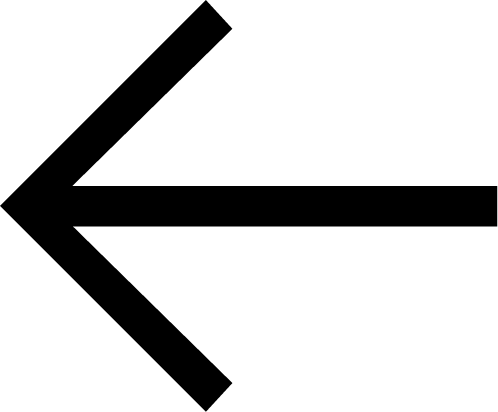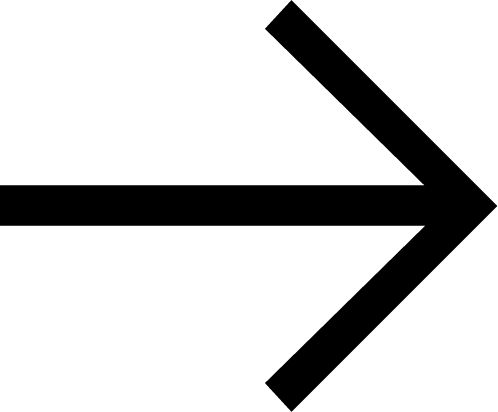The last “decolonial assemblies” took place in Rome, on June 8 and 15, 2023, at the Museo delle Civiltà (Museum of Civilizations), which is undertaking a process of radical revision aimed at questioning and rewriting its history, institutional ideology, pedagogical and research methods, and which will host the installation of the Entity of Decolonization – Borgo Rizza in the Museum of Opacities exhibition, part of the re-contextualization of the collections of the former Colonial Museum of Rome.
The setting for this last activation is the architectural space of EUR, the modernist district of the Museum, designed and planned for the Esposizione Universale di Roma (Rome Universal Exposition) of 1942, which was intended to commemorate the fascist regime’s twenty-years anniversary, but never took place due to the onset of the Second World War.
As expressed in the open invitation letter, from the dialogue between EUR and the Entity of Colonization of the Sicilian Latifundia, the conversation was meant as an occasion to reflect together on the way these places and architectures affect us today, as well as on the practice/s of archiving.
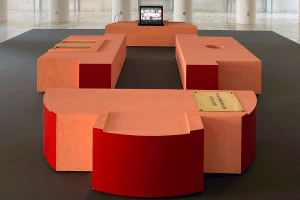
MATTEO: We’re sitting on the facade of the Entity of Colonization of Borgo Rizza, a facade that has shattered into fifteen pieces, opening the cracks through which certain conversations can take place. Also, this conversation is taking place inside another fascist architecture, which has been repurposed, but still evokes a certain ideology, a certain way of thinking about the relationship between bodies and architecture. It is monumental, and it makes us feel small. Hence, it's even more important to do this together in such a space, materializing the possibility to inhabit it in a different way, to make it ours.
As I entered the museum today, I encountered a model of the EUR district which is visibly deteriorating. It brought to mind an incredible exhibition I saw in Oslo a couple of years ago, where the curators presented architectural models from the past 70 or 80 years in a sort of archival space, deliberately leaving them covered in cobwebs and showing signs of degradation. It also made me think of The Picture of Dorian Gray, as if the model were the embodiment of the fascist conception of EUR crumbling, while the actual buildings remain intact.
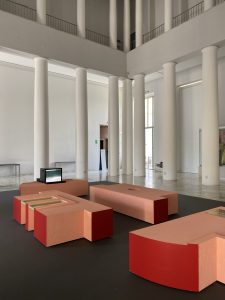
MATTEO: As Sandi usually says, “We'll be able to live between the cracks,” and I think that's a good way we can think about how to live in Italy today. We must understand how to regain, remodel, and reuse these spaces in order to make them ours.
SANDI: We need to open up these cracks because we are not treated equally, because this facade is still up to today. I think that our task, as people who are on the borderlines, is to open up these cracks, to destroy this facade as much as we can.
There is a literary image, from Brazilian author João Guimarães Rosa’s short story The Third Bank of the River [1962], which I would like to share. A father decides to abandon his family, so he retreats to his boat, but instead of crossing to the other side of the river, he remains in the middle. From this point, he observes his family constantly, and he sees everything differently. So, this midpoint becomes symbolic: it offers a perspective that transcends binary notions of here and there, us and them. It is “the third margin,” a space where alternative viewpoints emerge and new understandings are gained.
SANDI: I remember my grandma used to tell about British colonialism in terms of hosts and guests. When the British arrived, we hosted them, she said, but they were not willing to be guests; they imposed themselves as the hosts in our own country. They wanted us to follow them.
Coming back to this image of the man in the middle, what I would like is to meet people at the intersections of our diverse experiences, rather than having a God, or a State, or some other authority figure controlling us and trying to convince us that we are all equals, and that we only have one culture. If we want to be equal, we’ll meet at the intersection of our standpoints; otherwise, I am your guest and I will behave, or you are my guest and you will behave. For me, colonizers are the ones who don't know how to be guests, and they never learn. To be a gues means to follow other people's cultures and customs, other people's ways of being, not only in a touristic way, but in a radical way.
We're all guests of the West, and we are always made to feel as such. But now, I demand my right to host.
During the invasion and war in Kosovo, Bill Clinton asserted that, since we are all equal, we should set aside our differences. Conversely, the Zapatistas argue that, because we are all
equal, we are entitled to our differences. In the end, differences are a product of language, knowledge, and culture; they’re a product of classification, and those who have the power dictate which differences matter, and which differences can be accepted.
We all stand united in our pursuit of decolonization, yet we are speaking the language of the colonizer. We are all colonized because we are all speaking English, although most of us are not English. Language is power; it is the means through which the English empire exerted its dominance over the world, marginalizing and subjugating all the other languages.
How do colonial notions and categories inform our understanding of the world?
MATTEO: We’re speaking from a place that was built on classification, and on looting: a former colonial museum that plundered and stripped away the context of cultural artifacts to impose a colonial, racist narrative. One of our references for the work we’re doing on the museum’s colonial collection is the concept of opacity, as expressed by Édouard Glissant in his book Poetics of Relation [1990], where he advocates for the “right to opacity” as a means of resistance to the oppressive conditions of our present reality. Opacity served as our guiding principle, leading away from any form of classification, and it is a lens through which we can explore the concept of post-identity, because looking at the artifacts in the museum as embodying an identity or a culture would erase their value and complexity.
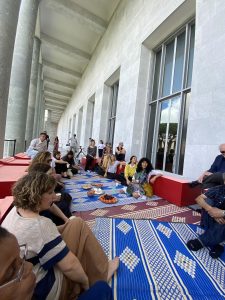
As a psychologist, I believe that, as human beings, we need to categorize things to navigate the world; otherwise, we would feel lost. However, we could certainly re-categorize things, finding different names. Maybe opacity could be a new category; and maybe we could find new names and concepts engaging with indigenous cultures, and using different names we could gain different understandings of the world.
I understand your perspective, but if you choose other nouns, you will still have a cosmology based on nouns, while the cosmology of indigenous people is primarily motion and flux. A noun fixes an understanding and erases relations. When an African artifact is removed from its original context and placed in a museum, its meaning is lost, because it depends on its relations. Everything in the world is related, so the question is not how to find different nouns, but how to start thinking in terms of relations, drawing inspiration from indigenous cultures or ancient philosophies. We need to criticize our cultural education back to the roots, all the way to ancient Greece, where arithmetic and geometry foundational to Western knowledge. Most of the world lives according to different cosmologies, and I’m not referring just to human beings, but to all animals and plants too. This is the real marvel, but most of us prefer to focus on artificial intelligence instead.
I feel like we live in a society and culture primarily governed by the values of the Enlightenment, which led the transition from faith in God to the belief in the human mind. The human mind gained power through the process of archiving, accumulating, recording, and storing knowledge, and this knowledge led to the creation of human laws, replacing divine laws. In the end, there is a fundamental contrast between the objectivity upheld by Western society and the reverence for the sacredness embodied by many of the objects in Western museums.
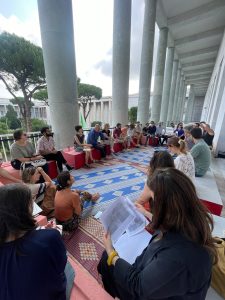
How can we understand the archive within a decolonial perspective?
SANDI: I'm interested about the archive as a means of storytelling, and today we find ourselves in a museum with the objective to archive and narrate history. I come from Palestine, where archiving is a relatively new practice, developed with the establishment of museums akin tothose in the West. Historically, the Middle East hasn’t felt the same urgency to archive, and this has led to the perception of lacking evidence for certain events. Here, instead, archiving has long been a priority, with efforts made to document and selectively present, or at times conceal certain aspects of history.
There are different ways of archiving. Problems arise when the European model of archiving is imposed on other cultures.
There are numerous, potentially infinite archives. While there are certainly institutionally established archives, when conducting research today, particularly on issues of coloniality, relying solely on these archives is insufficient. The omissions within them are glaring and extensive. It is necessary to build one’s own archive by gathering different contributions. For my research on a concentration camp constructed in Libya during the Italian colonial period, I'm working with oral history a lot, and I believe this is essential. Then, there is poetry, and there is literature: a lot of sources can become evidences, because the objective is not to uncover a definite truth, but to build a complex understanding, questioning conventional historical narratives, and opening them up to other voices, that have traditionally been silenced.
SANDI: In the late '80s, a group known as the New Israeli Historians emerged, challenging the traditional narratives of Israeli history. By opening up the Israeli colonial archive, they finally acknowledged fifty years of Palestinian oral history that had previously gone unheard.
In Western culture, the concept of archive is closely intertwined with that of history, as there is a prevailing belief that truth must be grounded in evidence—and the advent of new information technologies has complicated this notion, facilitating the creation and dissemination of knowledge that lacks evidential support. However, indigenous cultures do not rely primarily on evidence; instead, they are rooted in principles of respect and trust, in communal relationships. The archive is a tool of coloniality of knowledge, as controlling the archive can translate to controlling knowledge itself, and the modern rhetoric insisting on the necessity of evidence and archives for truth-telling is a product of colonial discourse.
Even in today's digital age, where files are stored in clouds, access to the cloud requires a computer, hence we always require organic memory. But we also require imagination to enable us to repurpose an archive with objectives that may not align with our own.
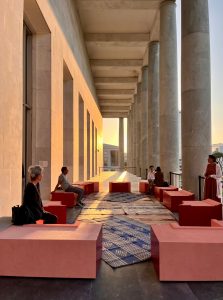
How can education be a process of decolonization?
When I taught in Sarajevo, I often took my students to a museum that, during the siege, received numerous art donations from artists worldwide. This resulted in an extraordinary collection of contemporary art, but there were no custodians or entrance fees to pay; you could simply walk in and observe these remarkable pieces often left uncared for. It was the antithesis of what one would expect from a museum, and obviously it made sense because of the war situation, yet it functioned remarkably well for me. This also reminded me of a novel by Richard Brautigan [The Abortion: An Historical Romance, 1966, 1971], in which he describes a library allowing people to place books anywhere they want, as there is no categorization in place. I think of this as a relational practice, and as a fantastic alternative approach to organizing a library, or an archive.
I’m also a teacher, and I cherish my role because I recognize its potential to positively influence others. In fact, I can think of many people who have influenced me in the past, and who have helped me to understand the things that I was feeling.
When flying, they advise putting on your mask first, before assisting others, right? Well, we all inhabit a colonial world, and I'm continually engaged in the process of decolonizing my mind, which makes me feel more and more liberated as I progress. However, there is no end to this process, and there?s no set formula for decolonization. What I find helpful in the classroom, as in mentorship, or in friendships, is to encourage voicing feelings and connecting intuition with intellect, even if this can be challenging at times, given our conditioned mindset.
I'm a teacher too, and I’m currently working at a prestigious university with all excellent students who have earned their place through coveted scholarships. At the start of my class, I always challenge them to reflect on their daily lives, and this usually triggers a crisis as they are accustomed to being given clear instructions for complicated tasks. Instead, I simply ask them
to observe how they're living in the present moment and share their observations with the class the next day. I do this because I think that one of the hardest parts of being an artist or a freelancer is managing one's own time and recognizing crises as opportunities for growth. But also, I think it is crucial to encourage students to question their lives.
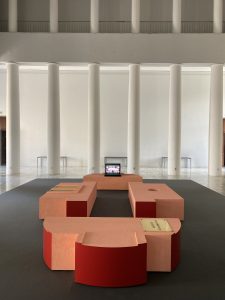
How does conversation create a space for decolonization?
MATTEO: It's important to criticize histories and notions of colonial archiving, but it’s even more important to be proactive and do something with these archives, and with these architectures. It’s important to profane them and make them new, subverting their original functions, envisioning new possibilities together. In the words of Rebecca Solnit, this conversation makes me see some “hope in the dark.” About the Occupy movement, which many consider a failure, the feminist author wrote that it made us see how there is a 99% of population beside the 1%, and even just this awareness can be seen as an incredible gift, as an important contribution to a global debate.
What I learned from the different meetings we already had is to put behind the need for an answer, the need for a solution. The more we have been asking questions, the more difficult it has got to find solutions. The questions have multiplied, but there are no answers, or maybe there are many answers. Anyway, I got to enjoy the time and space we share all together in conversation more and more. So, my expectations have changed, and my way of being in such a space has changed.
I think of conversation as a powerful form of collectivity. We don’t need to reach consensus, but to understand each other, and maybe we can negotiate a collective action.
I’m part of a non-violent group of militants, and we agree about the fact that violence is not an option, but there are still conflicts, of course. Through the assemblies, through conversation, we constantly redefine our way of acting, of staying together. We don't agree on everything, but we always find a common ground we all respect. Nothing is given for granted, and everyone is open to criticize themself constantly.
